|
 Secure Site
Secure Site
|
 |
Archive for the 'Well-being' Category
 Set Your Gong Meditation Timer - Dama tocando el Samisem -artista Shunsui Katsu-Miyagawa A certain type of meditation may help the brain retain images for short periods, says a new study on visual-spatial abilities.
When people view an object, they usually retain a clear picture of it in their visual short-term memory for only a few seconds before the details fade. An experiment by George Mason University researchers, though, found that people who practice Deity Yoga (DY) do much better at visual-spatial tasks shortly after they meditate.
The study’s authors, writing in a recent issue of Psychological Science, said the finding may have “many implications for therapy, treatment of memory loss and mental training.”
Practitioners of DY meditation zero in on an image of their deity, conjuring up a vivid, three-dimensional mental picture of it while honing in on the deity’s emotions and environment.
In the experiment, led by psychologist Maria Kozhevnikov, meditation and non-meditation practitioners performed two visual-spatial tests: imagining the rotation of a 3-D object and viewing an image, then trying to identify it from among several other similar images. After a first round of tests, the participants spent the next 20 minutes either meditating or performing non-meditative tasks before being tested again.
All the subjects had similar scores on the first round of tests, suggesting that meditating in general causes no overall, long-term improvement in visual-spatial skills.
However, those who performed DY meditation between rounds did much better on both tasks in the second phase of tests than those who did non-meditative activities or practiced Open Presence (OP) meditation. OP practitioners, rather than focusing on a specific thing, try to achieve awareness by contemplating a wider array of experiences, images or thoughts that may come to them.
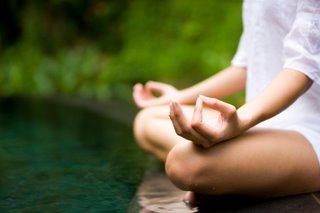 Choose a Gong Meditation Timer for Your Mindfulness Practice The study authors concluded that further investigations should be done to see if other visual meditation techniques can produce similar improvements in visual-spatial memory or if the results are specific to DY meditation.
Use our unique “Zen Clock” which functions as a Yoga & Meditation Timer. It features a long-resonating acoustic chime that brings your meditation or yoga session to a gradual close, preserving the environment of stillness while also acting as an effective time signal.
Our Yoga Timer & Clock can be programmed to chime at the end of the meditation or yoga session or periodically throughout the session as a kind of sonic yantra. The beauty and functionality of the Zen Clock/Timer makes it a meditation tool that can actually help you “make time” for meditation in your life. Bring yourself back to balance.
More information
The National Center for Complementary and Alternative Medicine has more about the health benefits of meditation.
SOURCE: Association for Psychological Science, news release, April 27, 2009
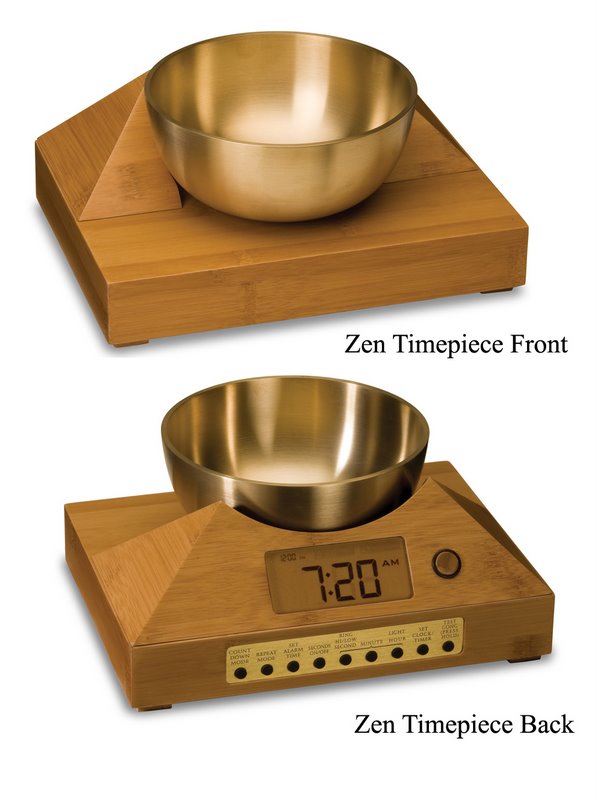 Set Your Gong Meditation Timer for Your Mindfulness Practice Now & Zen – The Gong Meditation Timer
 The Gong Meditation Store - Boulder, CO 1638 Pearl Street
Boulder, CO 80302
(800) 779-6383
orders@now-zen.com
Posted in Well-being, Yoga Timers by Now & Zen, Zen Timepiece by Now & Zen, Zen Timers
 Yoga Clocks and Timers by Now & Zen, Inc. YOGA FOR BEDTIME
Need help sleeping? Doing yoga exercises before bedtime can be just what you need
Sit up in bed comfortably, either with your legs folded or straight in front of you; whatever you can do with the most ease. Sit up and lean slightly back on your pillows or backboard. Close your eyes and rest your hands on your thighs and just breathe here for a few minutes. This doesn’t have to be a serious meditation but just a short while to do nothing but breathe.
Need a Yoga & Meditation timer? Get the natural one: A Bowl-Gong Bamboo Zen Timepiece from Now & Zen
Spiritual practices such as meditation or yoga are best done in an environment of beauty and tranquility. And the clock/timer you use for your practice can make a real difference in creating such an environment. But using a timer with artificial “beeps,” or even “recorded gongs,” coming out of a plastic box can be less than ideal. The Bamboo Zen Timepiece is unlike any other meditation timer on the market because it features a real, natural, acoustic, long-resonating gong, produced by its traditional Japanese style bowl-gong, or “rin-gong”. Moreover, The Zen Timepiece is made with sustainable natural bamboo, so it is as beautiful to see as it is to hear. Once you use a Zen Timepiece, nothing else will do.
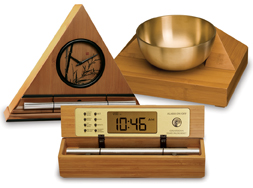 Yoga & Meditation Timer and Clocks Now & Zen – The Yoga Clock & Timer Store
1638 Pearl Street
Boulder, CO 80302
(800) 779-6383
Posted in Bamboo Chime Clocks, Meditation Timers, Meditation Tools, mindfulness practice, Well-being, Yoga Timer, Yoga Timers by Now & Zen, Zen Alarm Clock, Zen Timepiece by Now & Zen, Zen Timers
 Choose a Soothing Chime Timer for Your Mindfulness Practice - Utgarwa Beauty Mindfulness
“Mindfulness” is the spiritual practice of being aware of your present moment. World famous Zen monk Thich Nhat Hanh has developed the use of a bowl-gong in a practice he calls the “mindfulness bell.” When you hear the sound of the mindfulness bell, you are invited to take a moment to breathe in and out and center yourself in the present. This practice allows the sound of the bowl-gong to periodically connect you to the peace and tranquility that resides inside you right now. This delightful practice reduces stress and improves your overall health.
Mindfulness practice, is increasingly being employed in Western psychology to alleviate a variety of mental and physical conditions.
Scientific research into mindfulness generally falls under the umbrella of positive psychology. Research has been ongoing over the last twenty or thirty years, with a surge of interest over the last decade in particular. In 2011, The Natural Institute for Health’s National Center for Complementary and Alternative Medicine (NCCAM) released the findings of a study wherein magnetic resonance images of the brains of 16 participants 2 weeks before and after mindfulness meditation practitioners, joined the meditation program were taken by researchers from Massachusetts General Hospital, Bender Institute of Neuroimaging in Germany, and the University of Massachusetts Medical School. It concluded that “..these findings may represent an underlying brain mechanism associated with mindfulness-based improvements in mental health. [From Wikipedia]
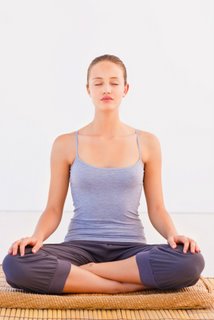 Choose a Yoga & Meditation Timer with Soothing Chimes
The Zen Timepiece can serve as a mindfulness bell in two ways: it can be set to strike on the hour (providing an hourly moment of stillness), or it can be set to strike at a programmed interval, such as every 20 minutes, or even every three hours.
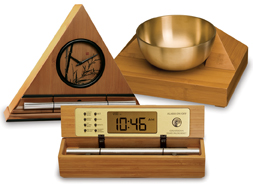 Soothing Chime Meditation & Yoga Timers from Now & Zen, Inc. Now & Zen – The Meditation
& Yoga Timer Store
1638 Pearl Street
Boulder, CO 80302
(800) 779-6383
Posted in Bamboo Chime Clocks, Meditation Timers, Meditation Tools, mindfulness practice, Well-being, yoga, Yoga Timer, Yoga Timers by Now & Zen, zen
 Wake-Up It’s often hard to find the inspiration to get out of your nice, comfortable bed when you’re still so tired. But according to Kundalini yoga, a built-in supply of energy lies dormant at the root of the spine, like a bulb that rests underground, waiting for a cue to bloom. By accessing this vitality, you’ll have the charge you need to fire up your day — without having to resort to a double latte.
“When you awaken your Kundalini energy and get it flowing up your spine,” says Maya Fiennes, a London yoga teacher and star of the DVD “Kundalini Yoga to Detox and Destress,” “you become alert and uplifted instead of sluggish and stressed.” We worked with Fiennes to develop this series of simple moves that stretch and strengthen the spine, increase vitality, reduce tension, release impurities, and improve focus — everything you need to face what lies ahead.
Camel Ride Targets
The lower spine.
What It Does
Releases lower-back tension, opens the hips, stimulates the digestive and immune systems, and promotes mental focus. “When you flex the spine,” says Fiennes, “you flex the mind.”
How to Do It
Sit cross-legged on the floor with your hands resting on your ankles. Bring your ribs and chest forward, gently arching your back, as you inhale. Then move the rib cage backward and round your lower spine as you exhale. Keep your neck relaxed and your chin parallel to the ground. Continue doing this exercise in unison with your breath for about two minutes and repeat. Set your Zen Alarm Clock to repeat every 2 minutes so that you can concentrate on streching.
Adapted from Body + Soul Magazine, March 2008 by Kate Hanley
 Natural Wake-Up Clock with Chime for Progressive Awakening Now & Zen’s Clock and Meditation Timer Store
1638 Pearl Street
Boulder, CO 80302
(800) 779-6383
Posted in Bamboo Chime Clocks, Chime Alarm Clocks, Natural Awakening, Now & Zen Alarm Clocks, sleep, Sleep Habits, Well-being
 Meditation Affects Your Body - Set Your Gong Meditation Timer It turns out peaceful thoughts really can influence our bodies, right down to the instructions we receive from our DNA, according to a new study.
Researchers for the study, published in the Public Library of Science, took blood samples from a group of 19 people who habitually meditated or prayed for years, and 19 others who never meditated.
The researchers ran genomic analyses of the blood and found that the meditating group suppressed more than twice the number of stress-related genes — about 1,000 of them — than the nonmeditating group.
The more these stress-related genes are expressed, the more the body will have a stress response like high blood pressure or inflammation. Over long periods of time, these stress responses can worsen high blood pressure, pain syndromes and other conditions.
The nonmeditating group then spent 10 minutes a day for eight weeks training in relaxation techniques that involved repeating a prayer, thought, sound, phrase or movement.
“What this does is to break the train of everyday thought — you no longer have stressful thoughts and because of that the body is able to return to a healthy state,” said Dr. Herbert Benson, director emeritus of the Benson-Henry Institute Mind/Body Medicine and an associate professor of medicine at Harvard Medical School.
By the end of the training, the novice meditating group was also suppressing stress-related genes, although at lower levels than those of the long-term meditating people.
Meditation in the Genes
“In the old days, we thought the mind didn’t affect the body,” Benson said. “In truth, it’s breaking down the very old rule.”
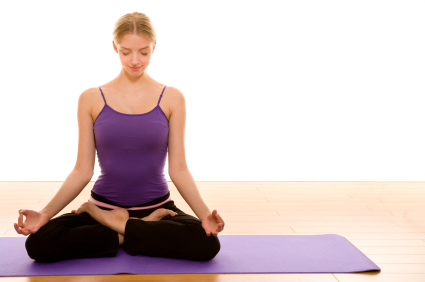 Gong Meditation Timers Have Soothing Acoustic Sounds Indeed, fellow mind-body researchers are finding more evidence that meditation and spiritual practices can influence the body in elemental ways.
Dr. Dean Ornish, professor of medicine and founder of the Preventive Medicine Research Institute at the University of California at San Francisco, recently found a relationship between meditation and genes in prostate cancer.
“This is an important pilot study showing that meditation alone may favorably alter gene expression in whole blood,” Ornish said. “These findings provide additional evidence to our recent study in PNAS [the Proceedings of the National Academy of Sciences] showing that meditation — when combined with better nutrition and moderate exercise — also favorably altered gene expression in prostate tissue.”
But researchers warn that only preliminary steps have been taken toward establishing a connection between genes and meditation.
“It’s on the limits of sensitivity of where we can go on genomics and proteomics,” said Towia Libermann, co-author of the study and director of the Beth Israel Deaconess Medical Center Genomics Center in Boston. “We can’t go into the brain itself, so a lot of what we do is going on in the blood.”
That difficult step from brain to blood can make research to link meditation and genetics difficult.
“Things happen, and genes get turned on or turned off — the genes make RNA, then the RNA makes proteins,” said Dr. Charles Raison, clinical director of the Mind Body Program in the department of psychiatry and behavioral sciences at Emory University in Atlanta.
Raison said it is those final proteins in the process that have a significant effect on the body, and sometimes RNA doesn’t end up making those proteins. Since genomic analysis measures only the RNA in the blood, it can’t guarantee that RNA had a specific effect on the body.
“Not everything gets down to the business end of the gun,” said Raison, who would also have liked to see more definition of what meditation means in the study as opposed to including any forms of repetitive prayer or yoga.
Future Thoughts for Study
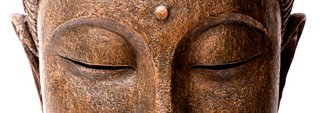 Buddha “Before you can say meditation does X, you’ve got to have a sense of what you mean by meditation,” Raison said. “There’s data to suggest that different meditative practices have different physical effects.”
Yet Raison found the stress-related study intriguing.
“The study is consistent with other lines of emerging research, including ours,” said Raison, who noted that lonely people have similar stress-related gene expression as the nonmeditating group in the study.
Another study by Dr. Richard Davidson at the University of Wisconsin found that people who were taught to meditate after a vaccination developed more antibodies to the virus than people who did not meditate afterward, Raison said.
According to Raison, it all falls in line with a modern-day misfiring of “danger pathways” that ramp up the body for fight or flight but also turn down the immune system and increase inflammation. If the meditation study proves correct, it could help stem these changes, along with exercise and diet.
“The gene changes have a lot to do with things that cause wear and tear on the body and the brain,” said Raison. “Diabetes, cardiovascular disease, dementia, many diseases in the modern world are linked to this sort of wear and tear.”
The researchers in the stress study would like to next focus on these types of individual diseases.
“If you’re about to be torn apart by a tiger, these stress responses are adaptive,” Raison said. “But if my boss is yelling at me every morning, these ancient responses are activated, but they are not useful.”
adapted from abcnews.com by Lauren Cox
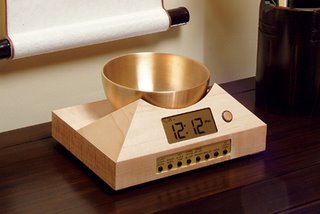 Gong Meditation Timers for Your Stillness Practice Although meditation can be done in almost any context, practitioners usually employ a quiet, tranquil space, a meditation cushion or bench, and some kind of timing device to time the meditation session. Ideally, the more these accoutrements can be integrated the better. Thus, it is conducive to a satisfying meditation practice to have a timer or clock that is tranquil and beautiful. Using a kitchen timer or beeper watch is less than ideal. And it was with these considerations in mind that we designed our digital Zen Alarm Clock and practice timer. This unique “Zen Clock” features a long-resonating acoustic chime that brings the meditation session to a gradual close, preserving the environment of stillness while also acting as an effective time signal.
It’s exquisite sounds summon your consciousness out of your meditative state with a series of subtle gongs. Once you experience the Zen Timepiece’s progressive tones, you’ll never want to meditate any other way. It serves as the perfect meditation timer. Available in 5 wood styles, including bamboo.
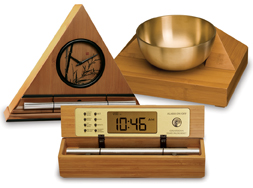 Bamboo Gong Meditation Timer and Chime Clocks Now & Zen – The Gong Meditation Timer Shop
Downtown Boulder
1638 Pearl Street
Boulder, CO 80302
(800) 779-6383
Posted in Well-being, Yoga Timer, Zen Timepiece by Now & Zen, Zen Timers
 Soothing Gong Meditation Timers - It's exquisite sounds summon your consciousness out of your meditative state with a series of subtle gongs. (HealthDay News) — There are many forms of mediation, most of which are rooted in ancient tradition.
For many people, it’s a great way to relax and soothe stress.
Here’s a summary of meditation’s common principles, courtesy of the U.S. National Institutes of Health’s National Center for Complementary and Alternative Medicine:
- Find a quiet place with little sound or distracting activity.
- Find a position that’s comfortable for you, including sitting, lying down, walking or standing.
- Focus completely on meditation, which in practice may include repeating a word or phrase, focusing mentally on an object or focusing on breathing in a certain way.
- Have an open mind and learn to acknowledge life’s distractions without necessarily judging or acting on them.
- Set your Gong Meditation Timer for 20 minutes and relax.
adapted from abcnews.com by By Diana Kohnle
Although meditation can be done in almost any context, practitioners usually employ a quiet, tranquil space, a meditation cushion or bench, and some kind of timing device to time the meditation session. Ideally, the more these accoutrements can be integrated the better. Thus, it is conducive to a satisfying meditation practice to have a timer or clock that is tranquil and beautiful. Using a kitchen timer or beeper watch is less than ideal.
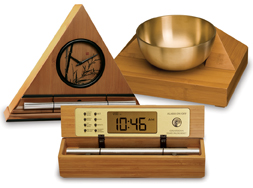 Gong and Chime Meditation Timers and Clocks
And it was with these considerations in mind that we designed our Zen Alarm Clock and practice timer. This unique “Zen Clock” features a long-resonating acoustic chime that brings the meditation session to a gradual close, preserving the environment of stillness while also acting as an effective time signal.
The Zen Clock can be programmed to chime at the end of the meditation session or periodically throughout the session as a kind of sonic yantra. The beauty and functionality of the Zen Clock/Timer makes it a meditation tool that can actually help you “make time” for meditation in your life.
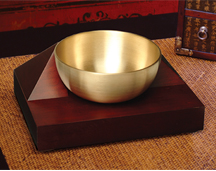 Gong Meditation Timers - preserving the environment of stillness. Now & Zen – The Gong Meditation Store
Downtown – Boulder, Colorado
1638 Pearl Street
Boulder, CO 80302
(800) 779-6383
orders@now-zen.com
Posted in Well-being, Yoga Timer, Zen Alarm Clock, Zen Timepiece by Now & Zen, Zen Timers
 Use Your Gong Meditation Timer More Often - Utamaro Ukiyoe Sharon Salzberg said her mind might be very different if it weren’t for meditation, and new neurologic research suggests that she might be right.
Troubled by a traumatic, stressful childhood, Salzberg traveled to India as a college student and discovered meditation. Not only did it help her deal with her painful past, Salzberg said, but the practice helped change the way her mind worked.
“I hadn’t really looked within,” said Salzberg, a co-founder of the Insight Meditation Society and author of seven books on meditation. “I felt much more presence, rather than being distracted. It felt like the whole world opened up for me.”
A new study from Yale University suggests that the brains of experienced meditators like Salzberg may actually work differently than brains of those who don’t meditate. The study gives scientists a window into the meditating mind, providing evidence that the practice appears to change the way the brain works and could give meditators a leg up when it comes to dealing with mental disorders.
Dr. Judson Brewer, medical director of the Yale Therapeutic Neuroscience Clinic, and his colleagues asked 10 experienced meditators and 13 people with no meditation experience to practice three basic meditation techniques: concentration, loving-kindness, and choiceless awareness.
The team then used functional magnetic resonance imaging to observe the participants’ brain activity when they were practicing the meditative techniques and when they were instructed not to think of anything in particular.
In a report published today in the Proceedings of the National Academy of Sciences, Brewer and his team report that the experienced meditators had decreased activity in an area of the brain called the default mode network, a region that is usually at work when the mind wanders. Even when the meditators weren’t meditating, this region of their brain was much quieter than in their inexperienced counterparts.
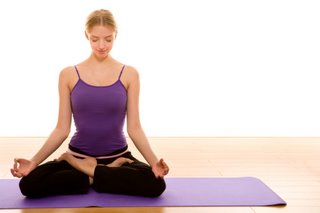 Meditation Gong Timers for Your Practice Most people spend a lot of time in mind wandering or daydreaming, and research shows that it comes with cognitive pros and cons. Scientists have shown that daydreaming can be a good thing, providing a boost for creativity, aiding in the processing of social functions, and refining other important psychological processes.
However, recent studies have suggested that a wandering mind is also an unhappy one. In 2010, one study found that people reported being significantly less happy when their minds were wandering than when they were engaged in the task at hand. Researchers suggest that this is because when our minds are wandering, most of us are worrying rather than living in the moment.
Brewer also notes that the psychological hallmark of many forms of mental illness — anxiety, depression, post-traumatic stress disorder, and schizophrenia — is a preoccupation with one’s own thoughts, specifically the negative ones. A series of studies have linked these disorders with overactivity or faulty neurological wiring in the default mode network, the brain region that was less active in experienced meditators.
“One of the things that meditation and basic mindfulness seems to be doing is quieting down this region of the brain,” Brewer said. “It absolutely makes sense, given what we know about the default mode network.”
Meditation isn’t a cure for mental illness, Brewer said, but he said his study suggests that there may be a neurological basis for the benefits that many meditators report — increased awareness, improved concentration, and a better ability to deal with the cognitive and emotional stresses of modern life.
Salzberg said she hopes that increased scientific study will continue to document the benefits of meditation for easing a troubled mind.
“It’s quite great that in our contemporary time where science is the language of validation, there’s evidence showing that in fact this is true,” Salzberg said.
adapted from abcnews.com by Carrie Gann
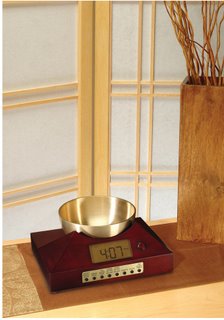 Singing Bowl - Gong Meditation Timer for Your Stillness Practice Now & Zen – The Only Gong Meditation Timer Store
1638 Pearl Street
Boulder, CO 80302
(800) 779-6383
Posted in Well-being, yoga, Yoga Timer, Zen Timepiece by Now & Zen, Zen Timers
 Meditation Practice - Try a Singing Bowl Meditation Timer for Your Stillness Practice Nearly 40 percent of Americans use some form of complementary and alternative medicine, according to the 2007 National Health Interview Survey. These practices include meditation, yoga, acupuncture and other types of mind-body-practices. And now, many are receiving the support of conventional doctors who have seen apparent benefits in some of their patients.
Some studies suggest meditation can help lower blood pressure and even improve immune function.
“There are a lot of great benefits for people that are starting to meditate and we find that that’s cumulative,” said Harden. “So the more you meditate, the more the benefits last.”
Meditation has more recently been tried to treat eating disorders, alcoholism, psoriasis, and even impotence. More than two dozen medical centers across the country, including specialized cancer centers, have attached complementary medicine centers, or provide meditation or other mind-body classes.
However, many of these uses of meditation are experimental, and the results vary by each patient. Many experts say meditation is more likely to treat medical conditions successfully when it is used in conjunction with conventional therapies.
Although meditation can be done in almost any context, practitioners usually employ a quiet, tranquil space, a meditation cushion or bench, and some kind of timing device to time the meditation session. Ideally, the more these accoutrements can be integrated the better. Thus, it is conducive to a satisfying meditation practice to have a timer or clock that is tranquil and beautiful. Using a kitchen timer or beeper watch is less than ideal.
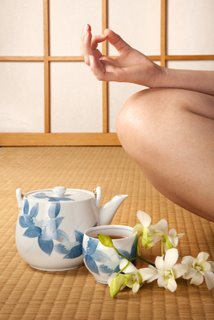 Meditation for Well-being, Choose a Gentle Zen Timer to End Your Practice
And it was with these considerations in mind that we designed our digital Zen Alarm Clock and practice timer. This unique “Zen Clock” features a long-resonating acoustic chime that brings the meditation session to a gradual close, preserving the environment of stillness while also acting as an effective time signal.
adapted from worldnews.com by Lara Salahi & Catherine Cole
Now & Zen – The Zen Timer Store
1638 Pearl Street
Boulder, CO 80302
(800) 779-6383
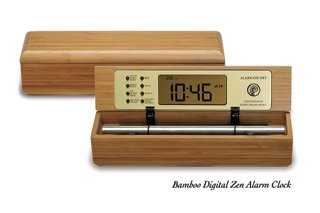 It's exquisite sounds summon your consciousness out of your meditative state with a series of subtle gongs. Once you experience the Zen Timepiece's progressive tones, you'll never want to meditate any other way.
Posted in Walking Meditation, Well-being, Yoga Timer, Yoga Timers by Now & Zen, zen
 Kiyonaga Torii, Bonsai Vendor - Soothing Sound Alarm Clock & Timer from Now & Zen, Inc. With your heart open and your breath flowing, make a choice to fully regain your sense of well-being and empowerment. Expand your attention to include full-body awareness by saying to yourself: “I’m aware of my whole body at once, here in this present moment.”
On any given day, you likely feel spontaneous moments of peace that arise when you’re watching children play, for instance, or exercising or witnessing a beautiful sunset. This step of the sequence helps you consciously initiate this relaxing feeling so you feel whole and in the moment by choice rather than by chance. After all, the things you focus on help create your mood — and what you focus on is up to you. By waking up to the present moment, you regain your sense of well-being and control. As Selby explains, “You can shift from being the victim of your mood swings to being the victor.”
 Meditation for an Uplifted Mood Meditation 101:
Do I really need a timer?
Time is such a drag, especially when you have entered that timeless state of bliss that sometimes arises when you meditate or practice yoga. Ideally, once you achieve samadhi through such practices, you can just go on and on with no concern for such petty worldly concerns such as what time it is. However, unless you’re a monk or nun, endless bliss can have a way of interfering with your life’s other commitments.
This is why using a timer as an accoutrement to your spiritual practice can be both handy for you and a way of being considerate to others.
Yet because time and timing can sometimes be a drag, it is important to make the best of it. And the best way to make time your ally is by using a clock/timer that is beautiful to both eye and ear. This is the role of the Zen Alarm Clock; it’s a practice timer and alarm clock housed in a beautiful hardwood case and featuring the long resonating and tranquil sounds of an acoustic chime or brass bowl-gong. Used as a timer, the Zen Clock brings a graceful end to your practice session. And as an alarm clock it makes waking up an exquisite experience you will actually look forward to! To see and hear our entire line of Zen Clocks and timers, visit us at: www.now-zen.com, or stop by our headquarters store in downtown Boulder Colorado on Pearl Street. Namaste.
adapted from Body + Soul, Jan/Feb 2007 by Terri Trespicio
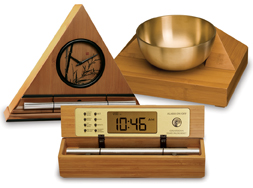 Soothing Sound Alarm Clock & Timers by Now & Zen, Inc. Now & Zen
The Soothing Alarm Clock Headquarter Store
1638 Pearl Street
Boulder, CO 80302
(800) 779-6383
Posted in Bamboo Chime Clocks, Meditation Timers, Meditation Tools, mindfulness practice, Now & Zen Alarm Clocks, Well-being, Yoga Timer, Zen Timepiece by Now & Zen, Zen Timers
 The Perfect Sleep Routine Tip: The Perfect Sleep Routine
Morning
Wake up to your Zen Alarm Clock at the same time every day, whether that’s 5:30 or 8:30. This ritual will help maintain your circadian rhythms and make it more likely you’ll fall asleep at the same time every night, too. (Yes, you can sleep an hour later on weekends.) As soon as you wake up, “get into some sort of daylight situation really quickly, even if it’s just stepping out on a balcony,” suggests sleep expert Joyce Walsleben, R.N., Ph.D. Bright light suppresses the production of melatonin, a sleep-inducing hormone in your brain, and helps set your body clock. If you’re going to have coffee, this is the time. Walsleben recommends that women avoid it from noon on, and limit their morning dose to a cup or two. And keep in mind that “if you drink an 8-ounce cup in the morning,” cautions Rubin Naiman, Ph.D., “you may still have small amounts of caffeine left in your blood at bedtime.”
Afternoon
At lunchtime, choose wisely: An animal study published in the journal Cell Metabolism in November 2007 linked a high-fat diet with a disrupted circadian clock. At least three hours before bed, get some exercise that raises your heart rate. “Aerobic exercise in the late afternoon — even just walking home from work — can help you burn off the stress of the day and raise your body temperature,” Walsleben explains. “This has the potential to deepen your sleep later on.” Also, avoid taking siestas during the day to help maintain your sleep drive.
Evening
Eat dinner several hours before bed to give your body time to digest, and avoid spicy or heavy foods if you’re prone to heartburn. If you drink wine or beer, do so “three or four hours away from bedtime,” advises Walsleben; while alcohol may speed the onset of sleep, it can disrupt the sleep cycle later.
Night
Avoid watching intense TV shows, paying bills, or engaging in other stimulating activities an hour or two before bedtime. Instead, dim the lights to stimulate the release of melatonin and do a few relaxing yoga poses (such as Legs Up the Wall and Child’s Pose) or 10 minutes of deep breathing or meditation. If you have a bathtub, use it. (Adding relaxing lavender oil will help.)
adapted from Body + Soul Magazine, May 2008 by Sarah Schmelling
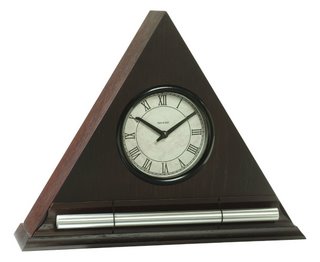 Dark Oak Zen Alarm Clock with Chime, the original progression clock Now & Zen’s Alarm Clock Shop
1638 Pearl Street
Boulder, CO 80302
(800) 779-6383
Posted in Bamboo Chime Clocks, Japanese Inspired Zen Clocks, Natural Awakening, Now & Zen Alarm Clocks, Progressive Awakening, sleep, Sleep Habits, Well-being
« Previous Page — « Previous Entries
Next Entries » — Next Page »
|
|
|
|